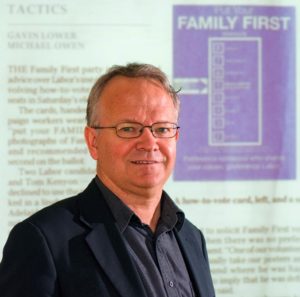 Move over, Clive Palmer – in its new Senator, Bob Day, Family First has found a serious and ambitious politician who could be the nucleus of a viable, alternative party of the right.
Move over, Clive Palmer – in its new Senator, Bob Day, Family First has found a serious and ambitious politician who could be the nucleus of a viable, alternative party of the right.
Flinders University political analyst Associate Professor Haydon Manning (pictured) has taken a keen interest in Australia’s minor parties for more than 20 years, and says Day, who takes up his Senate seat today, should not be confused with the ill-prepared amateurs who have recently found themselves elected to the Senate through luck.
Associate Professor Manning said Day’s election is the result of a sustained effort to reach parliament that saw him move from seeking pre-selection in the Liberal Party to membership of Family First, a party he has come to dominate in a very short time, and which he has already taken further to the right.
In South Australia, Family First has struggled to reach far beyond talk-back radio audiences, but Associate Professor Manning said that with an impressive CV that includes board roles in the Centre for Independent Studies think-tank and the HR Nicholls Society, Bob Day has an intellectual clout and economic credentials that could create a significant role for the party in conservative Australian politics.
“His politics on the role and size of government are discernibly to the right, and represent a shift from the more consensus, centre politics of Family First that we saw when Family First began in SA under Andrew Evans in 2002,” Professor Manning said.
“Obviously he is critical of Labour and the Greens – it will be interesting to see to what degree he can present a credible critique of the Abbott government.
“He does have a very strong story to tell about helping young people to get jobs, and when he’s on his territory – his knowledge of traineeships and apprenticeships – he presents a compelling case that the system is simply busted: it’s too expensive for employers to take on apprentices so they don’t want to, yet there are plenty of young people who don’t want to go to university but have left school and are on the dole.”
Associate Professor Manning said that Day’s proposal – that young people should undertake apprenticeships while accepting very low wages in the hope of good pay and steady jobs in the future – is one that resonates with many voters across the centre of politics.
Such ideas would be opposed by the unions and the ALP, but would not antagonise Day’s constituency, Associate Professor Manning said. Day’s more ideologically driven ideas, however, might set bells ringing.
“He is hot on no increase in taxes and no increase to the GST, but you wonder how credible that will be longer-term, given the demands of the health budget, aged care and pensions,” Associate Professor Manning said.
“Now that he’s a politician rather than a businessman, he has to worry about votes.”
If electoral reform of the Senate is introduced, that too could be a stumbling block for Day: “He would need to double his vote to the order of seven or eight per cent to retain his position, but then again he has six years to build support.”
Associate Professor Manning said that with the continuation of the 30-year trend of a declining vote for the two major parties and strengthening support for the mix of others (now including the Palmer United Party), there is still room for a party on the right which is believable and consistent, rather than merely populist.
Associate Professor Manning said Palmer United’s populism and its accent on money and celebrity may yet be its undoing.
“It will be interesting to watch the tussle on the right to see if Family First can manage to grow their support and win another Senate seat somewhere,” he said.
“With Bob Day, they’ve got more chance than ever before.”

